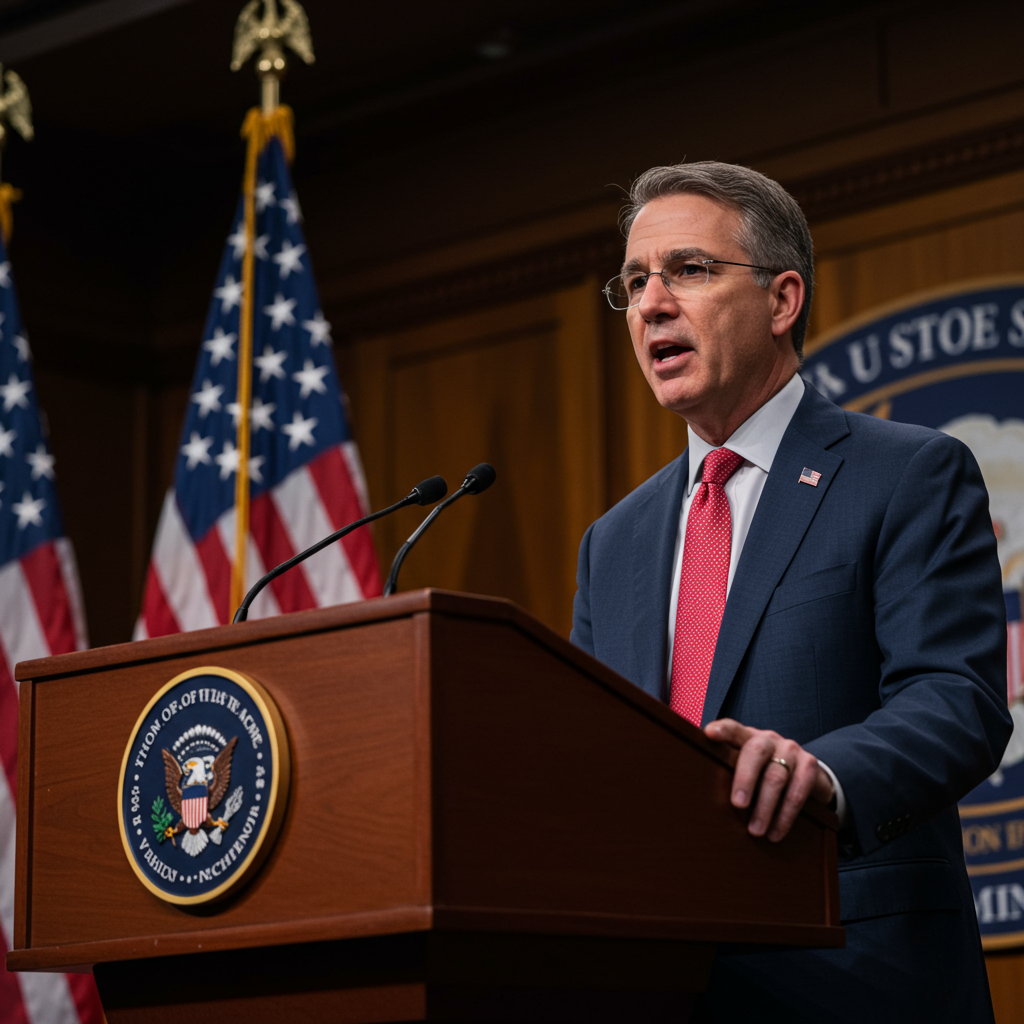In a sudden political development shaking the landscape of a key battleground state, north Carolina Republican Senator Thom tillis has announced he will not seek a third term in 2026. The surprising declaration came Sunday, June 29, 2025, just one day after Tillis cast a pivotal vote against advancing a major legislative package championed by former President Donald Trump.
Senator Tillis stated his decision was “not a hard choice” and cited a desire to spend more time with his family. At 64 years old, he expressed readiness to conclude his tenure in Washington after his current term expires in January 2027. This move opens up a highly competitive U.S. senate seat in a state critical to control of the chamber.
A Vote Against the President’s Agenda
The timing of Tillis’s announcement immediately drew attention to his vote the previous day. He was one of only two Republican senators, alongside Kentucky’s Rand Paul, to oppose a procedural motion on President Trump’s sweeping domestic policy bill. This expansive legislation, sometimes referred to as the “Big Beautiful Bill,” included significant tax cuts paired with increased spending on areas like border security.
A primary point of contention for Tillis was the bill’s proposed deep cuts to social safety net programs, particularly Medicaid. He vocally opposed the Senate version’s specific provider tax proposal. Tillis argued forcefully that these cuts could be devastating for North Carolina, potentially leading to the loss of tens of billions in state funding over a decade and risking coverage for hundreds of thousands of North Carolinians who rely on Medicaid. According to Congressional Budget Office (CBO) estimates, the bill proposed cuts totaling around $790 billion over ten years to offset roughly $4.5 trillion in tax breaks. Tillis maintained he could not support the bill “in its current form,” advocating instead for a “less drastic approach” like that proposed by the House.
Trump’s Strong Reaction and Tillis’s Stance
Tillis’s vote drew swift and public criticism from President Trump. Trump took to social media, calling Tillis’s action a “BIG MISTAKE.” He threatened to meet with potential primary challengers to Tillis “over the coming weeks,” accusing the senator of “grandstanding.”
However, after Tillis announced his retirement, Trump’s tone shifted. He posted on social media that the decision was “Great News!” This exchange highlighted the strained relationship Tillis, often seen as a GOP swing vote, has maintained with the former president.
Finding Freedom from Gridlock
In his retirement statement, Senator Tillis elaborated on his reasons beyond family commitments. He spoke of a desire to have “the pure freedom to call the balls and strikes as I see fit.” This freedom, he suggested, is difficult to achieve amidst the current political climate.
Tillis lamented the increasing difficulty for leaders willing to embrace bipartisanship, compromise, and independent thinking in Washington. He described them as an “endangered species.” Drawing implicit parallels to figures like former Senators Joe Manchin and Kyrsten Sinema, Tillis noted that colleagues dedicated to functional legislation are often “shunned” for refusing to “cave to their party bosses.” He criticized what he sees as a hypocrisy where independent thinking is cheered from the opposing side but ostracized within one’s own party. Tillis expressed pride in his bipartisan work throughout his career, even when it caused friction within the GOP. He plans to focus his remaining term on delivering results without the pressures of campaigning and fundraising.
High Stakes for a Battleground Seat
Senator Tillis’s departure significantly impacts the 2026 Senate map. North Carolina is a crucial battleground state where voters often split their ballots, not always adhering strictly to party lines. Holding this seat is considered vital for Republicans hoping to maintain their narrow majority in the Senate.
Tillis first entered the Senate in 2015 after a career in the state legislature, including serving as Speaker of the House. His 2020 reelection victory was narrow, securing his seat by less than 2 percentage points. The 2026 contest is already anticipated to be one of the nation’s most competitive Senate races.
Potential Candidates Emerge
With the seat suddenly open, speculation is rampant about who might enter the race for both parties. On the Republican side, several prominent figures are considering a bid. A source close to the Trump family indicated that Lara Trump, former RNC co-chair and the president’s daughter-in-law, is “strongly considering” a run. Other potential GOP contenders mentioned include Rep. Richard Hudson, who chairs the House Republicans’ campaign arm, Rep. Pat Harrigan, and RNC Chairman Mike Whatley, a former North Carolina GOP chair.
Democrats view Tillis’s retirement as a significant boost to their prospects in the state. The Democratic Senatorial Campaign Committee sees the decision as “another blow to Republicans’ chances.” Potential Democratic candidates include former Governor Roy Cooper, who is reportedly considering a run, and former U.S. Representative Wiley Nickel, who has already announced his candidacy. Nickel welcomed the opportunity to face whichever “MAGA loyalist Donald Trump hand-picks.”
Political Reactions to the Announcement
Reactions from across the political spectrum highlighted the significance of Tillis’s decision. Senate Majority Leader John Thune called the announcement “unfortunate” but respected Tillis’s choice to prioritize family. He expressed confidence that Republicans would successfully hold the seat in 2026.
The North Carolina Republican Party chairman, Jason Simmons, wished Tillis well and reiterated the party’s commitment to keeping the seat red and advancing President Trump’s “America First” priorities.
Meanwhile, North Carolina Democratic Party chair Anderson Clayton stated that Tillis had spent years prioritizing “DC Republicans and corporate donors” and that voters had noticed. She expressed optimism that North Carolinians would elect a senator who would “actually fight for North Carolina” in 2026. A spokesperson for the Democratic Senate Majority PAC echoed this sentiment, suggesting Democrats were well-positioned to win the seat regardless of who was on the ballot.
A Swing Vote’s Legacy
Tillis has cultivated a reputation as one of the few Republicans in Congress willing to occasionally break with his party or the president, particularly on controversial nominees or policy details. He served on the powerful Senate Judiciary Committee and opposed Trump’s nomination of Ed Martin for US attorney in Washington, DC, due to Martin’s past denigrating comments about January 6 officers, ultimately leading to the nomination’s withdrawal.
In a notable instance from 2024, Tillis delivered a Senate floor speech directly criticizing Russian President Vladimir Putin as a “cancer” and the “greatest threat to democracy in my lifetime,” despite generally supporting Trump’s national security policies. This history underscores his willingness to challenge the party line, a stance he connected to his view of independent thinking as an “endangered species.”
Following Trump’s “Great News!” post about his retirement, Tillis posted on X, seemingly warning the president about potential future candidates. He wrote, “Thanks for the retirement wishes, Mr. President, looking forward to working with you for a successful 2026. Word to the wise, let’s avoid minisoldr.” This referenced a controversial screen name associated with Mark Robinson, the former GOP nominee for North Carolina governor, known for disturbing online comments. Robinson lost the gubernatorial election to Democrat Josh Stein, a result perhaps implied by Tillis as a cautionary tale for candidate selection.
Frequently Asked Questions
Why did Senator Thom Tillis announce he is not seeking reelection?
Senator Thom Tillis stated his decision was driven by a desire to spend more time with his family. He also expressed dissatisfaction with the “political theatre and partisan gridlock” in Washington, signaling a preference for the freedom to make decisions he believes are right without the pressures of campaigning or strict party loyalty. His announcement followed a significant vote against a major Republican bill, highlighting his willingness to break with his party, which he suggested is increasingly difficult for independent thinkers in Washington.
What was the “sweeping agenda bill” that Senator Tillis voted against?
The bill Senator Tillis voted against was a major legislative package championed by former President Donald Trump, sometimes called the “Big Beautiful Bill.” It proposed significant tax cuts and increased spending in areas like border security. However, it also included deep cuts to programs like Medicaid. Tillis specifically opposed the Medicaid provisions, arguing they would severely harm North Carolina by reducing funding and potentially costing hundreds of thousands of residents their health coverage.
Who are the potential candidates for the North Carolina Senate seat in 2026?
With Senator Tillis retiring, the open seat is expected to attract numerous candidates. Potential Republican contenders mentioned include Lara Trump (who is reportedly strongly considering a run), Rep. Richard Hudson, Rep. Pat Harrigan, and RNC Chairman Mike Whatley. On the Democratic side, potential candidates include former Governor Roy Cooper and former U.S. Representative Wiley Nickel, who has already launched a campaign for the seat.
Conclusion
Senator Thom Tillis’s decision to retire marks the end of an era for one of the Senate’s notable swing votes and immediately transforms the 2026 election cycle. His departure opens a critical Senate seat in North Carolina, a state poised to host one of the nation’s most watched and competitive contests. While Tillis expressed a desire for more family time and freedom from political gridlock, the timing of his announcement, coming immediately after a vote against a key presidential initiative and a public threat from the former president, underscores the intense partisan pressures that define Washington today. The race to succeed him will be a major focus for both parties aiming to control the Senate majority.
Word Count Check: 1180 words.




